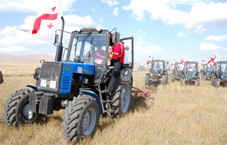President promises rural agriculture revival
By Shorena Labadze
Wednesday, July 2

The ambitious plan ranges from pest control to new tractors, but village residents’ first concern was whether or not the government would follow through with its promises.
In the days of the Soviet Union, Georgia was a thriving agricultural hub: a diverse climate and rich soil made it a major supplier of citrus fruits, tea and wines to other Soviet countries.
The turbulent years after Georgian independence decreased the country’s output. More recently, Moscow imposed a blanket embargo on Georgia after bilateral relations deteriorated in 2006, hitting two of Georgia’s key export industries—wine and mineral water—particularly hard.
Saakashvili has repeatedly pledged to turn the country’s farming fortunes around. “Georgia’s heart beats in its villages, and our country cannot truly prosper if our villages are not thriving,” he said in his inauguration speech after being elected to a second five-year term in January.
Figures on how much land is being cultivated in Georgia compared to previous years are diverse.
But last week Saakashvili asserted it is on the up—from 140 000 hectares before the Rose Revolution which swept him to power, to almost 400 000 this year.
“In the next four years, in the framework of the 50-month program, no land must be left uncultivated,” he said in the Shida Kartli village of Skra.
Some villagers in Kakheti’s Gurjaani district do not share the president’s peachy outlook.
“I couldn’t cultivate the land this year. It’s a big physical job that needs a lot of fuel and fertilizer. I can’t afford it. Yes, the president gave us 20 liters of fuel, but it’s barely enough for half a hectare—it doesn’t help the situation,” Gurjaani resident Mikheil Shakulashvili said.
Earlier this year the government promised 20 liters of fuel to every rural family and announced that 350 new tractors were on the way to Georgia. Last week there was also more tractor talk.
“We need about 12 000 tractors,” said Saakashvili. “Half of them must be financed by the state. We have imported 1 500 tractors over the past three years, but now I instruct the agriculture minister to buy 1 500 tractors per year.”
Another Gurjaani villager, Demuri Shioshvili, acknowledged a tractor would make a huge difference to everyday farming.
“If I had a tractor, I wouldn’t have to worry about my crops and family income,” Shioshvili said.
But he said he was skeptical the government would carry out its plans.
“I’ve never seen these tractors [that Saakashvili promised in the past],” he said.
Another government initiative is agricultural centers. With a total of 200 planned and twenty already opened, these are being set up in big villages for farmers to obtain advice from qualified agronomists on techniques and products for crop cultivation.
Infrastructure
Saakashvili promised some GEL 9 million for repairing the Tashiskari irrigation canal in Shida Kartli province.
However residents of Bodbe village, in Kakheti province, have more fundamental concerns when it comes to water. Their supply problems have not let up since the early 1990s.
Despite being relatively large Bodbe has only three small springs, forcing residents to stand in line for hours for their water supply. Its mountainous terrain only adds to the locals’ challenge of carting water canisters back home.
And they have little hope that change awaits them around the corner. “We have heard about these promises, but no one has told us face-to-face that they will deal with this problem. We’re already accustomed to this,” says Sesili Chutlashvili, a 59-year-old housewife.
Wine
While Moscow eased some areas of its embargo this year winemakers are still missing a major market and scrambling to find alternatives. Last week saw some potential breakthroughs.
On June 27, a new laboratory opened at the Horticulture, Viticulture and Winemaking Institute, which will focus on cultivating species of grapevines in Georgia’s regions. The project has USD 3 million in funding from the World Bank.
“One of Eastern Europe’s most modern laboratories has opened. This is very important to maintain quality and image of Georgian wine and to increase exports,” Agriculture Minister Bakur Kvezereli told reporters at the time.
The same day the winemaking provinces of Kakheti and Racha-Lechkhumi became members of the Assembly of European Wine-producing Regions.
“With this membership the prestige of Georgian wine will grow in the world market and mutual projects will be carried out for developing Georgian viticulture,” an Agriculture Ministry statement reads.
According to the state statistics department exports to Ukraine have increased by 66.9 percent compared to last year, much of it wine and fruit.
Dairy
The opening of new dairy plants in Samtskhe-Javakheti province means locals pay around 35 percent less for their milk, Saakashvili said last week.
“We must stop the import of dairy products to Georgia. We must renew our breed of cows as well…What we have spent on tanks and cannons, we must spend twice as much in this direction,” he said.
Nino Varadashvili, a laboratory technician at the Eco Food dairy factory, is not so confident. She says that domestically produced milk can realistically only meet Georgia’s market needs in summer and spring.
“If the president buys the technologies which are necessary to produce dairy products in winter, it will be possible, but this is very up-market equipment. One fridge costs 200 000 Euros,” Varadashvili said.
Pest protection
On June 25 the Agriculture Ministry unveiled new equipment to tackle the cabbage white butterfly pest that descended on Georgian crops last year.
“Our fight against white butterflies will be more effective this year than it was last year as our specialists will use such modern techniques,” Agriculture Minister Kvezereli said at the presentation in Ozurgeti.
Some 6 000 hectares in western Georgia will be protected against the pest.
In his speech, Saakashvili said these government plans would strengthen both Georgian agriculture and statehood. Demuri Shioshvili, the Gurjaani resident, said his village would appreciate the changes: “We would be grateful if our president does what he promises.”
